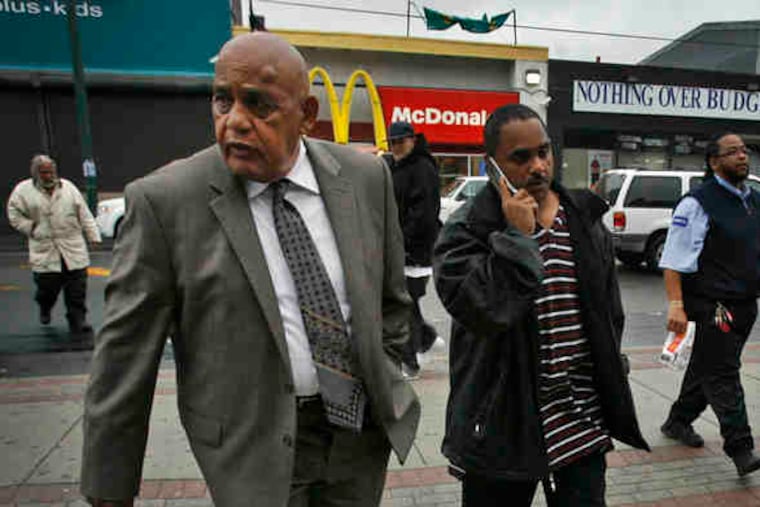For some, anything but status quo
As Street finds victory in loss, his brother may feel encouraged to seek old office.

The 24 percent of the vote that ex-convict T. Milton Street Sr. got in the Democratic mayoral primary Tuesday was significant, but it sounds more impressive than it actually was, given the dismal 18 percent turnout.
Street, who played the media as well as Yo-Yo Ma plays the cello, somehow planted the preelection notion among pundits that if he got 15 percent of the vote, it would be a rebuke of Mayor Nutter. So now he's boasting that he triumphed.
"We made an impact. Philadelphia elections will never be the same," said Street, who was released last June after serving a 30-month sentence in a federal prison for failing to file his income taxes on time.
It was interesting that while just about everyone considered Street's run for mayor a joke, he was treated like a legitimate candidate, invited to forums, appearing on TV like someone who should be mayor.
Even the Inquirer editorial board asked Street in for an endorsement interview. But we do that with every candidate we can find. Believe it or not, some get their names on a ballot and then don't want to be found.
Of course, Street never showed up. After postponing his date with the board again and again, his son, T. Milton Street Jr., called about three times after the scheduled hour for the meeting had passed to say they were "on the way." With a pile of other work to do, I told him to forget it, but regretted that what I expected to be an entertaining, if not enlightening, political discussion wouldn't occur.
Street's 24 percent in the primary is significant because it may be enough to entice his brother to run for his old office. But it wasn't going to take much to do that. The former mayor is obviously bored with teaching a few college courses.
John F. Street was occupying some idle time by running the Philadelphia Housing Authority board. But fired PHA Executive Director Carl Greene messed that up with the sex-harassment allegations against him, which prompted a federal inquiry and the board's removal.
If John Street doesn't run for mayor as an independent, he may seek an at-large City Council seat. Either way, he can irritate Nutter. Street has never said it, but when you talk to him, you can tell he gets rankled every time Nutter insinuates that he had to fumigate City Hall to get rid of its rotten ethics.
Nutter should have some sympathy for the former mayor. In four years, he will likely find himself in a similar position, out of office and lamenting that the end came all too soon. It's a common malady among former big-city mayors, especially the African Americans. With little chance of winning statewide election, they sit on the sidelines and snipe at other players, or find another way to reenter the game.
I can easily see Street doing a Marion Barry and taking a City Council seat, just like the former Washington mayor. Street still wants to mix it up with political antagonists, show them how an old hand gets things done.
John Street could content himself with being a behind-the-scenes power. His mentee, Darrell L. Clarke is in a race with Marian Tasco for the Council presidency. But having surrogates on Council follow his lead won't sate Street's appetite for politics.
In contrast, labor leader John Dougherty seems to have found his niche as a wizard behind the screen. The loser of a 2008 state Senate bid found it much more pleasurable to be the rainmaker behind several winning campaigns in Tuesday's primary. "The days of me running for things are over," he told reporter Tom Fitzgerald. "I think that I'm more comfortable where I'm at."
Using a since-closed loophole that allowed a bevy of smaller political action committees to dole out the cash, the main PAC for the electrical workers' union that Dougherty heads donated money to winning Council primary candidates Bobby Henon and Mark Squilla, as well as incumbent at-large Councilman Bill Green.
Green says there were no strings attached to the union money he received, and I believe him. But he risks being compared to Rick Mariano, a former councilman who admitted that Dougherty's aides even chose his chief of staff after he was elected.
Mariano was later convicted on corruption charges that had nothing to do with Dougherty or campaign donations, but Green shouldn't want his name mentioned in the same breath.
That he's taking that risk shows what the need for campaign funds does to you, especially in a city that puts limits on the amounts that can be contributed.
Even with campaign finance limits, money makes a difference. Several Council primary winners were also among the top fund-raisers, including Henon, Squilla, Green, and Maria Quiñones-Sánchez. Her ability to raise money was surprising given predictions that she might be the most vulnerable incumbent.
In the end, the only Council incumbent to lose was Frank Rizzo. He and City Commissioner Marge Tartaglione were the apparent targets of voters' wrath for taking early-retirement money but running for reelection. Tasco did that, too. She won easily in her district, but her opponent, Lamont Thomas, got 30 percent of the vote.
That was more impressive than Milton Street's showing because Thomas is little known while Street's is a familiar name. Both men, however, represent the same message: that there's enough frustration with the current political leadership in Philadelphia that some people will vote for anyone if he doesn't represent the status quo. Who can predict the results if that frustration continues to grow?